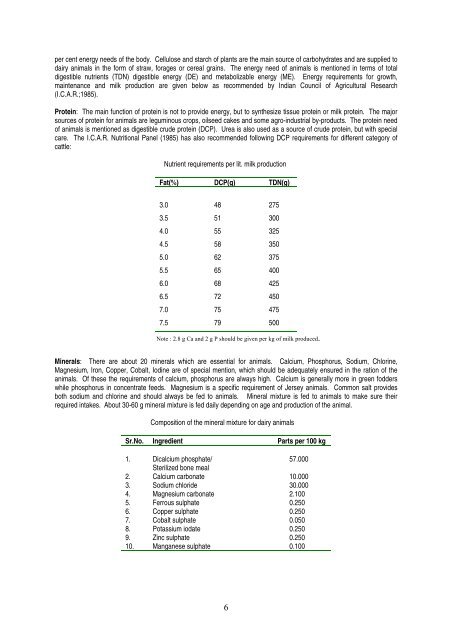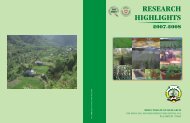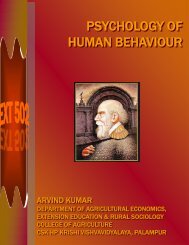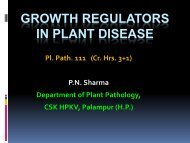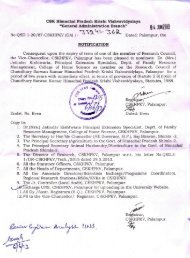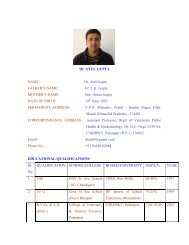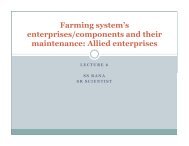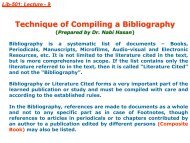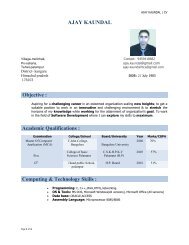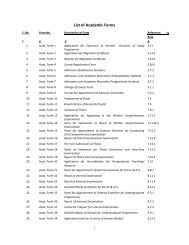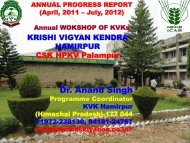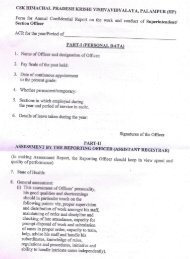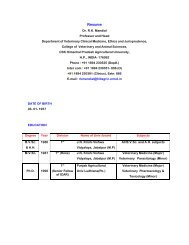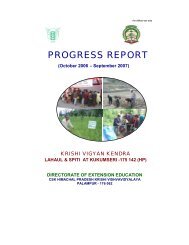animal production - CSK Himachal Pradesh Agricultural University ...
animal production - CSK Himachal Pradesh Agricultural University ...
animal production - CSK Himachal Pradesh Agricultural University ...
You also want an ePaper? Increase the reach of your titles
YUMPU automatically turns print PDFs into web optimized ePapers that Google loves.
per cent energy needs of the body. Cellulose and starch of plants are the main source of carbohydrates and are supplied to<br />
dairy <strong>animal</strong>s in the form of straw, forages or cereal grains. The energy need of <strong>animal</strong>s is mentioned in terms of total<br />
digestible nutrients (TDN) digestible energy (DE) and metabolizable energy (ME). Energy requirements for growth,<br />
maintenance and milk <strong>production</strong> are given below as recommended by Indian Council of <strong>Agricultural</strong> Research<br />
(I.C.A.R.;1985).<br />
Protein: The main function of protein is not to provide energy, but to synthesize tissue protein or milk protein. The major<br />
sources of protein for <strong>animal</strong>s are leguminous crops, oilseed cakes and some agro-industrial by-products. The protein need<br />
of <strong>animal</strong>s is mentioned as digestible crude protein (DCP). Urea is also used as a source of crude protein, but with special<br />
care. The I.C.A.R. Nutritional Panel (1985) has also recommended following DCP requirements for different category of<br />
cattle:<br />
Nutrient requirements per lit. milk <strong>production</strong><br />
Fat(%) DCP(g) TDN(g)<br />
3.0 48 275<br />
3.5 51 300<br />
4.0 55 325<br />
4.5 58 350<br />
5.0 62 375<br />
5.5 65 400<br />
6.0 68 425<br />
6.5 72 450<br />
7.0 75 475<br />
7.5 79 500<br />
Note : 2.8 g Ca and 2 g P should be given per kg of milk produced.<br />
Minerals: There are about 20 minerals which are essential for <strong>animal</strong>s. Calcium, Phosphorus, Sodium, Chlorine,<br />
Magnesium, Iron, Copper, Cobalt, Iodine are of special mention, which should be adequately ensured in the ration of the<br />
<strong>animal</strong>s. Of these the requirements of calcium, phosphorus are always high. Calcium is generally more in green fodders<br />
while phosphorus in concentrate feeds. Magnesium is a specific requirement of Jersey <strong>animal</strong>s. Common salt provides<br />
both sodium and chlorine and should always be fed to <strong>animal</strong>s. Mineral mixture is fed to <strong>animal</strong>s to make sure their<br />
required intakes. About 30-60 g mineral mixture is fed daily depending on age and <strong>production</strong> of the <strong>animal</strong>.<br />
Composition of the mineral mixture for dairy <strong>animal</strong>s<br />
Sr.No. Ingredient Parts per 100 kg<br />
1. Dicalcium phosphate/ 57.000<br />
Sterilized bone meal<br />
2. Calcium carbonate 10.000<br />
3. Sodium chloride 30.000<br />
4. Magnesium carbonate 2.100<br />
5. Ferrous sulphate 0.250<br />
6. Copper sulphate 0.250<br />
7. Cobalt sulphate 0.050<br />
8. Potassium iodate 0.250<br />
9. Zinc sulphate 0.250<br />
10. Manganese sulphate 0.100<br />
6


